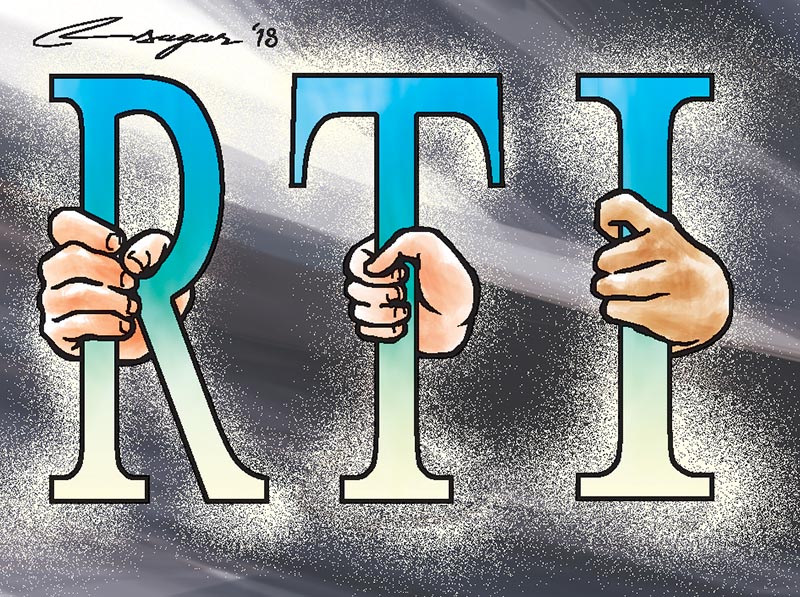Right to information: A tool to strengthen democracy
Lack of information may prevent citizens from realising their aspirations, because it leaves them without the basis to participate in any debate, discussion and question-answer session regarding the decision-making process
Right to Information (RTI) is usually used as a synonym for democracy. This is a tool to strengthen citizens’ sovereignty. Sweden is the first country to enact the first RTI law in the world in 1766. So far (until the end of 2017), 119 countries in the world have enacted RTI laws. This is also one of the main components of human rights. Developed countries, particularly the European countries were the first ones to champion the RTI. While Asian countries have also practised RTI laws pretty well, Latin American countries are well ahead in its implementation.
The RTI is all about making citizens informed. Informed societies mean a lively and functioning democracy. The RTI empowers people to seek information from the government and public organizations and ask for government documents and their copies. Through the RTI, citizens know about government decisions and the limitations of the country and the government.
RTI promotes transparency and accountability. Citizens feel honored when they get to exercise their right to have access to the source of information. Just as they exercise their right to information, citizens also know about their right to privacy. In this process, citizens benefit in two ways — they are getting information through the RTI and protecting their personal information under the right to privacy.
RTI laws can play a crucial role in combating corruption.
Similarly, the RTI also is important in promoting and upholding human rights.
Public information officers (PIOs) play a crucial role in ensuring effective implementation of the RTI. Information officers directly support good governance. The state can enhance its popularity by strengthening the information dissemination process. It can also increase its acceptance by introducing effective RTI procedures so as to disseminate required information in a speedy and convenient way.
While PIOs should be given facilities, they also should be given a good environment to perform and connect with the people who seek information. This way PIOs can deliver maximum level information available with them. A good PIO means how quickly and accurately s/he can address the citizens’ call for information.
Necessary information must be provided at the earliest possible after getting request from the people, because delayed justice will mean injustice to those seeking information. Delay in providing information may also raise doubt among members of the public over the government agencies and public organizations.
Mexico and Serbia are considered the best countries when it comes to delivering information. In these countries, citizens may get any information from any type of sources such as email, text message, phone or any social networking sites. Citizens can even track the progress regarding their RTI request just like in air parcel tracking system.
Even if citizens cannot get all the information as per their expectations, they will feel satisfied that their application is under process and that it is on the way to concerned agency. For example, if a person asks “Hello Sarkar” of the Nepal government on the number of people who have so far climbed Mt Everest, the concerned agency may respond in two parts.
First, it will forward the query to the Ministry of Tourism which holds all the information about Mt Everest with pictures, names of the climbers and royalty it has collected from the climbers. This may satisfy the person who sought the information. Secondly, Prime Minister’s Office may ask all data immediately from the concerned agency and inform the concerned citizen.
One of the most important aspects of the RTI is citizens must be able to get information free of cost. Information provided to the concerned citizens must be up to date. It must be ensured that citizens get information they have asked for in the most readable way possible.
For example, it is easier for an RTI applicant to access information if they are provided in Word or Excel formats rather than in the PDF format. People provided with the information must be able to use and reuse the data easily.
Lack of information may prevent citizens from realising their aspirations, because it leaves them without the basis to participate in any debate, discussions and question-answer sessions regarding the decision-making process even if the decisions are detrimental to them. The RTI provisions can increase an individual’s aspiration to participate in a debate that is directly or indirectly linked to him or her.
Similarly, the government and its agencies must have their websites with an exclusive button which people can click to learn about the RTI and related issues. The websites must contain all publications, legal documents and quarterly and annual reports.
Staff must be trained on RTI and ways to honour people’s right to information. A government that focuses on effective implementation of RTI earns more trust and faith from its citizens. Transparency should be the motto of any government and its agencies, which through RTI can be strengthened, ultimately benefitting all sections of the society. Right to information plays a vital role in strengthening participatory democracy.
Baskota is chief commissioner, National Information Commission






